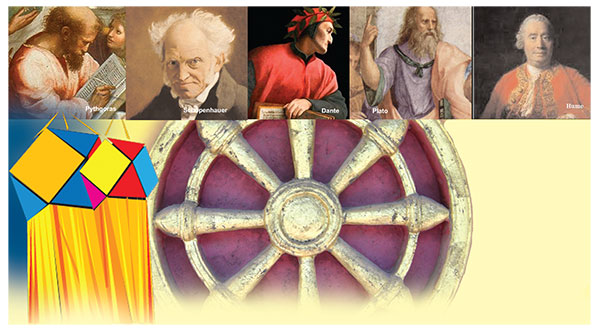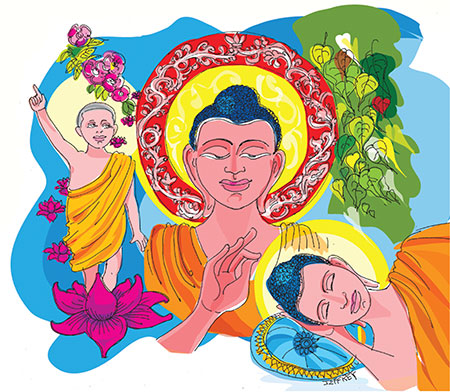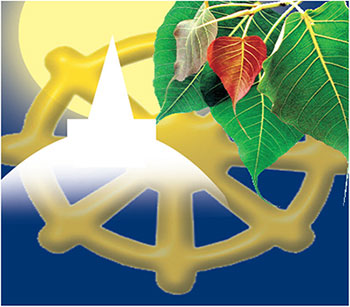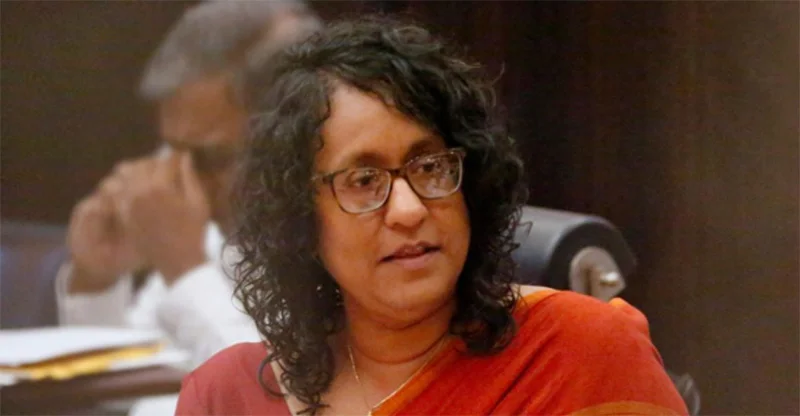Features
A note on the Doctrine of Kamma and Rebirth in the West

(FROM THE BUDDHA AND HIS TEACHINGS BY Venerable Nārada Mahāthera)
The doctrine of Kamma and rebirth is the keystone of the philosophy of Plato. Beings are forever travelling through “a cycle of necessity”; the evil they do in one semicircle of their pilgrimage is expiated in the other. In the Republic, we find Kamma personified as “Lachesis, the daughter of necessity,” at whose hands disembodied beings choose their incarnations. Orpheus chooses the body of a swan. Thersites that of an ape, Agamemmon that of an eagle. “In like manner, some of the animals passed into men, and into one another, the unjust passing into the wild, and the just into the tame.”
In the period preceding the Persian Wars, the contact of the West with the East caused a revolt against the simple eschatology of Homer, and the search began for a deeper explanation of life. This quest, it is interesting to note, was begun by the Ionian Greeks of Asia Minor, who were influenced by India.
Pythagoras, who was born about 580 B.C. on the Island of Samos, travelled widely and, according to his biographer, studied the teaching of the Indians. It was he who taught the West the Doctrine of Kamma and Rebirth.
“It is not too much,” says Garbe in his Greek Thinkers, “to assume that the curious Greek, who was a contemporary of the Buddha, would have acquired a more or less exact knowledge of the East, in that age of intellectual fermentation, through the medium of Persia.”
REBIRTH AS VIEWED BY OTHERS
Bhagavad Gitā:–
“As a man, casting off worn-out garments, taketh the new ones, so the dweller in the body, casting off worn-out bodies, entereth into others that are new.”
“For certain is death for the born, and certain is birth for the dead.”
Herodotus:–
“The Egyptians propounded the theory that the human soul is imperishable, and that where the body of anyone dies it enters into some other creature that may be ready to receive it.”
Pythagoras:
“All have souls, all is soul, wandering in the organic world and obeying eternal will or law.”
Plato:–
“Soul is older than body. Souls are continually born over again into this life.”
Ovid on Pythagoras: translated by Dryden —
“Death so called, is but old matter dressed
In some new form: and in varied vest
From tenement to tenement though tossed,
The soul is still the same, the figure only lost.
And as the softened wax new seals receives,
This face assumes, and that impression leaves,
Now called by one, now by another name,
The form is only changed, the wax is still the same,
Then, to be born is to begin to be
Some other thing we were not formerly.
That forms are changed I grant;
That nothing can continue in the figure it began”
Schopenhauer:–
“We find the doctrine of Metempsychosis, springing from the earliest and noblest ages of the human race, always spread abroad in the earth as the belief of the great majority of mankind, nay really as the teaching of all religions, with the exception of the Jews and the two which have proceeded from it in the most subtle form however, and coming nearest to the truth as has already been mentioned in Buddhism. Accordingly, while Christians console themselves with the thought of meeting in another world in which one regains one’s complete personality and knows oneself at once, in these other religions the meeting again is already going on only incognito. In the succession of births those who now stand in close connection or contact with us will also be born along with us at our next birth, and will have the same or analogous relations and sentiments towards us as now, whether these are of a friendly or hostile description.
“Taught already in the Vedas, as in all sacred books of India, metempsychosis is well known to be the kernel of Brahmanism and Buddhism. It accordingly prevails at the present day in the whole of the non-Mohammedan Asia, thus among more than half of the whole human race, as the firmest conviction and with an incredibly strong practical influence. It was also the belief of the Egyptians from whom it was received with enthusiasm by Orpheus, Pythagoras and Plato: the Pythagoreans, however, specially retain it. That it was also taught in the mysteries of the Greeks undeniably follows the ninth book of Plato’s Laws.”
“The Edda also especially in the ‘Volusna’ teaches metempsychosis; not less was it the foundation of the Druids”.
“According to all this, the belief in metempsychosis presents itself as the natural conviction of man, whenever he reflects at all in an unprejudiced manner…” The World As Will And Idea
Hume:–
“Metempsychosis is the only system of immortality that philosophy can hearken to.”
Disraeli:–
“There is no system so simple, and so little repugnant to our understanding as that of metempsychosis. The pains and pleasures of this life are by this system considered as the recompense or the punishment of our actions in another state.”
Dante:–

Tennyson:–
“And then son, who through thy mortal weight shall again return below.”
Emerson:–
“We must infer our destiny from the preparation we are driven by instinct to have innumerable experiences which are of no visible value, and which we may receive through many lives before we shall assimilate or exhaust them.”
Lessing:–
“Why should I not come back as often as I am capable of acquiring fresh knowledge, fresh experience? Do I bring away so much from one that there is nothing to repay the trouble of coming back?”
Huxley:–
“Like the doctrine of evolution itself, that of transmigration has its roots in the realm of reality.
“Everyday experience familiarises us with the facts which are grouped under the name of heredity. Everyone of us bears upon him obvious marks of his parentage perhaps of remoter relationships. More particularly the sum of tendencies to act in a certain way, which we call character, is often to be traced through a long series of progenitors and collaterals. So we may justly say that this character, this moral and intellectual essence of a man does veritably pass over from one fleshly tabernacle to another, and does really transmigrate from generation to generation. In the new-born infant the character of the stock lies latent, and the ego is little more than a bundle of potentialities, but, very early these become actualities: from childhood to age they manifest themselves in dullness or brightness, weakness or strength, viciousness or uprightness; and with each feature modified by confluence with another character, if by nothing else, the character passes on to its incarnation in new bodies.
“The Indian philosophers called character, as thus defined, ‘Karma’.
It is this Karma which passed from life to life and linked them in the chain of transmigrations; and they held that it is modified in each life, not merely by confluence of parentage but by its own acts.”
“Or if through lower lives I came
Tho’ all experience past became,
Consolidate in mind and frame.
I might forget my weaker lot;
For is not our first year forgot
The haunts of memory echo not.”
Wordsworth:–
“Our birth is but a sleep and a forgetting
The soul that rises with us, our life’s star
Hath had elsewhere its setting,
And cometh from after :
Not in entire forgetfulness,
And not in utter nakedness.”
Shelley:–
“If there be no reasons to suppose that we have existed before that period at which existence apparently commences, then there are no grounds for supposing that we shall continue to exist after our existence has apparently ceased.”
Professor Francis Bowen of Harvard University in urging Christians to accept rebirth writes :
 “Our life on earth is rightly held to be a discipline and a preparation for a higher and eternal life hereafter, but if limited to the duration of a single mortal body, it is so brief as to seem hardly sufficient for so grand a purpose. Three score years and ten must surely be an inadequate preparation for eternity. But what assurance have we that the probation of the soul is confined within such narrow limits? Why may it not be continued or repeated through a long series of successive generations, the same personality animating one after another an indefinite number of tenements of flesh and carrying forward into each the training it has received, the character it has formed, the temper and dispositions it has indulged, in the steps of existence immediately preceding. It need not remember its past history even whilst bearing the fruits and the consequence of that history deeply ingrained into its present nature. How many long passages of any one life are now completely lost to memory, though they may have contributed largely to build up the heart and the intellect which distinguish one man from another? Our responsibility surely is not lessened by such forgetfulness. We still seem accountable for the misuse of time, though we have forgotten how or on what we have wasted it. We are even now reaping the bitter fruits, through enfeebled health and vitiated desires and capacities, of many forgotten acts of self-indulgence, wilfulness and sin — forgotten just because they were so numerous.
“Our life on earth is rightly held to be a discipline and a preparation for a higher and eternal life hereafter, but if limited to the duration of a single mortal body, it is so brief as to seem hardly sufficient for so grand a purpose. Three score years and ten must surely be an inadequate preparation for eternity. But what assurance have we that the probation of the soul is confined within such narrow limits? Why may it not be continued or repeated through a long series of successive generations, the same personality animating one after another an indefinite number of tenements of flesh and carrying forward into each the training it has received, the character it has formed, the temper and dispositions it has indulged, in the steps of existence immediately preceding. It need not remember its past history even whilst bearing the fruits and the consequence of that history deeply ingrained into its present nature. How many long passages of any one life are now completely lost to memory, though they may have contributed largely to build up the heart and the intellect which distinguish one man from another? Our responsibility surely is not lessened by such forgetfulness. We still seem accountable for the misuse of time, though we have forgotten how or on what we have wasted it. We are even now reaping the bitter fruits, through enfeebled health and vitiated desires and capacities, of many forgotten acts of self-indulgence, wilfulness and sin — forgotten just because they were so numerous.
“If every birth were an act of absolute creation, the introduction to life of an entirely new creature, we might reasonably ask why different souls are so variously constituted at the outset? If metempsychosis is included in the scheme of the divine government of the world, this difficulty disappears altogether. Considered from this point of view, every one is born into the state which he had fairly earned by his own previous history. The doctrine of inherited sin and its consequence is a hard lesson to be learned. But no one can complain of the dispositions and endowments which he has inherited so to speak from himself, that is from his former self in a previous state of existence. What we call death is only the introduction of another life on earth, and if this be not a higher and better life than the one just ended, it is our own fault.”
PRE-EXISTENCE
“I laid me down upon the shore
And dreamed a little space;
I heard the great waves break and roar;
The sun was on my face.
“My idle hands and fingers brown
Played with the pebbles grey;
The waves came up, the waves went down;
Most thundering and gay.
“The pebbles they were smooth and round
And warm upon my hands;
Like little people I had found
Sitting among the sands.
“The grains of sand so shining small.
So through my fingers ran;
The sun shown down upon it all.
And so my dream began;
How all of this had been before,
How ages far away.
I lay on some forgotten shore
As here I lie today.
“The waves came up shinning up the sands,
As here today they shine;
And in my pre-Pelasgian hands
The sand was warm and fine.
I have forgotten whence I came
Or what my home might be,
Or by what strange and savage name
I called that thundering sea.
I only know the sun shone down
As still it shines today.
And in my fingers long and brown
The little pebbles lay.
Features
Ethnic-related problems need solutions now

In the space of 15 months, President Anura Kumara Dissanayake has visited the North of the country more than any other president or prime minister. These were not flying visits either. The president most recent visit to Jaffna last week was on the occasion of Thai Pongal to celebrate the harvest and the dawning of a new season. During the two days he spent in Jaffna, the president launched the national housing project, announced plans to renovate Palaly Airport, to expedite operations at the Kankesanthurai Port, and pledged once again that racism would have no place in the country.
There is no doubt that the president’s consistent presence in the north has had a reassuring effect. His public rejection of racism and his willingness to engage openly with ethnic and religious minorities have helped secure his acceptance as a national leader rather than a communal one. In the fifteen months since he won the presidential election, there have been no inter community clashes of any significance. In a country with a long history of communal tension, this relative calm is not accidental. It reflects a conscious political choice to lower the racial temperature rather than inflame it.
But preventing new problems is only part of the task of governing. While the government under President Dissanayake has taken responsibility for ensuring that anti-minority actions are not permitted on its watch, it has yet to take comparable responsibility for resolving long standing ethnic and political problems inherited from previous governments. These problems may appear manageable because they have existed for years, even decades. Yet their persistence does not make them innocuous. Beneath the surface, they continue to weaken trust in the state and erode confidence in its ability to deliver justice.
Core Principle
A core principle of governance is responsibility for outcomes, not just intentions. Governments do not begin with a clean slate. Governments do not get to choose only the problems they like. They inherit the state in full, with all its unresolved disputes, injustices and problemmatic legacies. To argue that these are someone else’s past mistakes is politically convenient but institutionally dangerous. Unresolved problems have a habit of resurfacing at the most inconvenient moments, often when a government is trying to push through reforms or stabilise the economy.
This reality was underlined in Geneva last week when concerns were raised once again about allegations of sexual abuse that occurred during the war, affecting both men and women who were taken into government custody. Any sense that this issue had faded from international attention was dispelled by the release of a report by the Office of the Human Rights High Commissioner titled “Sri Lanka: Report on conflict related sexual violence”, dated 13.01.26. Such reports do not emerge in a vacuum. They are shaped by the absence of credible domestic processes that investigate allegations, establish accountability and offer redress. They also shape international perceptions, influence diplomatic relationships and affect access to cooperation and support.
Other unresolved problems from the past continue to fester. These include the continued detention of Tamil prisoners under the Prevention of Terrorism Act, in some cases for many years without conclusion, the failure to return civilian owned land taken over by the military during the war, and the fate of thousands of missing persons whose families still seek answers. These are not marginal issues even when they are not at the centre stage. They affect real lives and entire communities. Their cumulative effect is corrosive, undermining efforts to restore normalcy and rebuild confidence in public institutions.
Equal Rights
Another area where delay will prove costly is the resettlement of Malaiyaha Tamil communities affected by the recent cyclone in the central hills, which was the worst affected region in the country. Even as President Dissanayake celebrated Thai Pongal in Jaffna to the appreciation of the people there, Malaiyaha Tamils engaged in peaceful campaigns to bring attention to their unresolved problems. In Colombo at the Liberty Roundabout, a number of them gathered to symbolically celebrate Thai Pongal while also bringing national attention to the issues of their community, in particular the problem of displacement after the cyclone.
The impact of the cyclone, and the likelihood of future ones under conditions of climate change, make it necessary for the displaced Malaiyaha Tamils to be found new places of residence. This is also an opportunity to tackle the problem of their landlessness in a comprehensive manner and make up for decades if not two centuries of inequity.
Planning for relocation and secure housing is good governance. This needs to be done soon. Climate related disasters do not respect political timetables. They punish delay and indecision. A government that prides itself on system change cannot respond to such challenges with temporary fixes.
The government appears concerned that finding new places for the Malaiyaha Tamil people to be resettled will lead to land being taken away from plantation companies which are said to be already struggling for survival. Due to the economic crisis the country has faced since it went bankrupt in 2022, the government has been deferential to the needs of company owners who are receiving most favoured treatment. As a result, the government is contemplating solutions such as high rise apartments and townhouse style housing to minimise the use of land.
Such solutions cannot substitute for a comprehensive strategy that includes consultations with the affected population and addresses their safety, livelihoods and community stability.
Lose Trust
Most of those who voted for the government at the last elections did so in the hope that it would bring about system change. They did not vote for the government to reinforce the same patterns that the old system represented. At its core, system change means rebalancing priorities. It means recognising that economic efficiency without social justice is a short-term gain with long-term costs. It means understanding that unresolved ethnic grievances, unaddressed wartime abuses and unequal responses to disaster will eventually undermine any development programme, no matter how well designed. Governance that postpones difficult decisions may buy time, but lose trust.
The coming year will therefore be decisive. The government must show that its commitment to non racism and inclusion extends beyond conflict prevention to conflict resolution. Addressing conflict related abuses, concluding long standing detentions, returning land, accounting for the missing and securing dignified resettlement for displaced communities are not distractions from the government programme. They are central to it. A government committed to genuine change must address the problems it inherited, or run the risk of being overwhelmed when those problems finally demand settlement.
by Jehan Perera
Features
Education. Reform. Disaster: A Critical Pedagogical Approach

 This Kuppi writing aims to engage critically with the current discussion on the reform initiative “Transforming General Education in Sri Lanka 2025,” focusing on institutional and structural changes, including the integration of a digitally driven model alongside curriculum development, teacher training, and assessment reforms. By engaging with these proposed institutional and structural changes through the parameters of the division and recognition of labour, welfare and distribution systems, and lived ground realities, the article develops a critical perspective on the current reform discourse. By examining both the historical context and the present moment, the article argues that these institutional and structural changes attempt to align education with a neoliberal agenda aimed at enhancing the global corporate sector by producing “skilled” labour. This agenda is further evaluated through the pedagogical approach of socialist feminist scholarship. While the reforms aim to produce a ‘skilled workforce with financial literacy,’ this writing raises a critical question: whose labour will be exploited to achieve this goal? Why and What Reform to Education
This Kuppi writing aims to engage critically with the current discussion on the reform initiative “Transforming General Education in Sri Lanka 2025,” focusing on institutional and structural changes, including the integration of a digitally driven model alongside curriculum development, teacher training, and assessment reforms. By engaging with these proposed institutional and structural changes through the parameters of the division and recognition of labour, welfare and distribution systems, and lived ground realities, the article develops a critical perspective on the current reform discourse. By examining both the historical context and the present moment, the article argues that these institutional and structural changes attempt to align education with a neoliberal agenda aimed at enhancing the global corporate sector by producing “skilled” labour. This agenda is further evaluated through the pedagogical approach of socialist feminist scholarship. While the reforms aim to produce a ‘skilled workforce with financial literacy,’ this writing raises a critical question: whose labour will be exploited to achieve this goal? Why and What Reform to Education
In exploring why, the government of Sri Lanka seeks to introduce reforms to the current education system, the Prime Minister and Minister of Education, Higher Education, and Vocational Education, Dr. Harini Amarasuriya, revealed in a recent interview on 15 January 2026 on News First Sri Lanka that such reforms are a pressing necessity. According to the philosophical tradition of education reform, curriculum revision and prevailing learning and teaching structures are expected every eight years; however, Sri Lanka has not undertaken such revisions for the past ten years. The renewal of education is therefore necessary, as the current system produces structural issues, including inequality in access to quality education and the need to create labour suited to the modern world. Citing her words, the reforms aim to create “intelligent, civil-minded citizens” in order to build a country where people live in a civilised manner, work happily, uphold democratic principles, and live dignified lives.
Interpreting her narrative, I claim that the reform is intended to produce, shape, and develop a workforce for the neoliberal economy, now centralised around artificial intelligence and machine learning. My socialist feminist perspective explains this further, referring to Rosa Luxemburg’s reading on reforms for social transformation. As Luxemburg notes, although the final goal of reform is to transform the existing order into a better and more advanced system: The question remains: does this new order truly serve the working class? In the case of education, the reform aims to transform children into “intelligent, civil-minded citizens.” Yet, will the neoliberal economy they enter, and the advanced technological industries that shape it, truly provide them a better life, when these industries primarily seek surplus profit?
History suggests otherwise. Sri Lanka has repeatedly remained at the primary manufacturing level within neoliberal industries. The ready-made garment industry, part of the global corporate fashion system, provides evidence: it exploited both manufacturing labourers and brand representatives during structural economic changes in the 1980s. The same pattern now threatens to repeat in the artificial intelligence sector, raising concerns about who truly benefits from these education reforms
That historical material supports the claim that the primary manufacturing labour for the artificial intelligence industry will similarly come from these workers, who are now being trained as skilled employees who follow the system rather than question it. This context can be theorised through Luxemburg’s claim that critical thinking training becomes a privileged instrument, alienating the working class from such training, an approach that neoliberalism prefers to adopt in the global South.
Institutional and Structural Gaps
Though the government aims to address the institutional and structural gaps, I claim that these gaps will instead widen due to the deeply rooted system of uneven distribution in the country. While agreeing to establish smart classrooms, the critical query is the absence of a wide technological welfare system across the country. From electricity to smart equipment, resources remain inadequate, and the government lags behind in taking prompt initiative to meet these requirements.
This issue is not only about the unavailability of human and material infrastructure, but also about the absence of a plan to restore smart normalcy after natural disasters, particularly the resumption of smart network connections. Access to smart learning platforms, such as the internet, for schoolchildren is a high-risk factor that requires not only the monitoring of classroom teachers but also the involvement of the state. The state needs to be vigilant of abuses and disinformation present in the smart-learning space, an area in which Sri Lanka is still lagging. This concern is not only about the safety of children but also about the safety of women. For example, the recent case of abusive image production via Elon Musk’s AI chatbox, X, highlights the urgent need for a legal framework in Sri Lanka.
Considering its geographical location, Sri Lanka is highly vulnerable to natural disasters, the frequency in which they occur, increasing, owing to climate change. Ditwah is a recent example, where villages were buried alive by landslides, rivers overflowed, and families were displaced, losing homes that they had built over their lifetimes. The critical question, then, is: despite the government’s promise to integrate climate change into the curriculum, how can something still ‘in the air ‘with climate adaptation plans yet to be fully established, be effectively incorporated into schools?
Looking at the demographic map of the country, the expansion of the elderly population, the dependent category, requires attention. Considering the physical and psychological conditions of this group, fostering “intelligent, civic-minded” citizens necessitates understanding the elderly not as a charity case but as a human group deserving dignity. This reflects a critical reading of the reform content: what, indeed, is to be taught? This critical aspect further links with the next section of reflective of ground reality.
Reflective Narrative of Ground Reality
Despite the government asserting that the “teacher” is central to this reform, critical engagement requires examining how their labour is recognised. In Sri Lanka, teachers’ work has long been tied to social recognition, both utilised and exploited, Teachers receive low salaries while handling multiple roles: teaching, class management, sectional duties, and disciplinary responsibilities.
At present, a total teaching load is around 35 periods a week, with 28 periods spent in classroom teaching. The reform adds continuous assessments, portfolio work, projects, curriculum preparation, peer coordination, and e-knowledge, to the teacher’s responsibilities. These are undeclared forms of labour, meaning that the government assigns no economic value to them; yet teachers perform these tasks as part of a long-standing culture. When this culture is unpacked, the gendered nature of this undeclared labour becomes clear. It is gendered because the majority of schoolteachers are women, and their unpaid roles remain unrecognised. It is worth citing some empirical narratives to illustrate this point:
“When there was an extra-school event, like walks, prize-giving, or new openings, I stayed after school to design some dancing and practice with the students. I would never get paid for that extra time,” a female dance teacher in the Western Province shared.
I cite this single empirical account, and I am certain that many teachers have similar stories to share.
Where the curriculum is concerned, schoolteachers struggle to complete each lesson as planned due to time constraints and poor infrastructure. As explained by a teacher in the Central Province:
“It is difficult to have a reliable internet connection. Therefore, I use the hotspot on my phone so the children can access the learning material.”
Using their own phones and data for classroom activities is not part of a teacher’s official duties, but a culture has developed around the teaching role that makes such decisions necessary. Such activities related to labour risks further exploitation under the reform if the state remains silent in providing the necessary infrastructure.
Considering that women form the majority of the teaching profession, none of the reforms so far have taken women’s health issues seriously. These issues could be exacerbated by the extra stress arising from multiple job roles. Many female teachers particularly those with young children, those in peri- or post-menopause stages of their life, or those with conditions like endometriosis may experience aggravated health problems due to work-related stress intensified by the reform. This raises a critical question: what role does the state play in addressing these issues?
In Conclusion
The following suggestions are put forward:
First and foremost, the government should clearly declare the fundamental plan of the reform, highlighting why, what, when, and how it will be implemented. This plan should be grounded in the realities of the classroom, focusing on being child-centred and teacher-focused.
Technological welfare interventions are necessary, alongside a legal framework to ensure the safety and security of accessing the smart, information-centred world. Furthermore, teachers’ labour should be formally recognised and assigned economic value. Currently, under neoliberal logic, teachers are often left to navigate these challenges on their own, as if the choice is between survival or collapse.
Aruni Samarakoon teaches at the Department of Public Policy, University of Ruhuna
Kuppi is a politics and pedagogy happening on the margins of the lecture hall that parodies, subverts, and simultaneously reaffirms social hierarchies.
By Aruni Samarakoon
Features
Smartphones and lyrics stands…

 Diliup Gabadamudalige is, indeed, a maestro where music is concerned, and this is what he had to say, referring to our Seen ‘N’ Heard in The Island of 6th January, 2026, and I totally agree with his comments.
Diliup Gabadamudalige is, indeed, a maestro where music is concerned, and this is what he had to say, referring to our Seen ‘N’ Heard in The Island of 6th January, 2026, and I totally agree with his comments.
Diliup: “AI avatars will take over these concerts. It will take some time, but it surely will happen in the near future. Artistes can stay at home and hire their avatar for concerts, movies, etc. Lyrics and dance moves, even gymnastics can be pre-trained”.
Yes, and that would certainly be unsettling as those without talent will make use of AI to deceive the public.
Right now at most events you get the stage crowded with lyrics stands and, to make matters even worse, some of the artistes depend on the smartphone to put over a song – checking out the lyrics, on the smartphone, every few seconds!
In the good ole days, artistes relied on their talent, stage presence, and memorisation skills to dominate the stage.
They would rehearse till they knew the lyrics by heart and focus on connecting with the audience.

Smartphones and lyrics stands: A common sight these days
The ability of the artiste to keep the audience entertained, from start to finish, makes a live performance unforgettable That’s the magic of a great show!
When an artiste’s energy is contagious, and they’re clearly having a blast, the audience feeds off it and gets taken on an exciting ride. It’s like the whole crowd is vibing on the same frequency.
Singing with feeling, on stage, creates this electric connection with the audience, but it can’t be done with a smartphone in one hand and lyrics stands lined up on the stage.
AI’s gonna shake things up in the music scene, for sure – might replace some roles, like session musicians or sound designers – but human talent will still shine!
AI can assist, but it’s tough to replicate human emotion, experience, and soul in music.
In the modern world, I guess artistes will need to blend old-school vibes with new tech but certainly not with smartphones and lyrics stands!
-

 Editorial3 days ago
Editorial3 days agoIllusory rule of law
-

 News4 days ago
News4 days agoUNDP’s assessment confirms widespread economic fallout from Cyclone Ditwah
-

 Business6 days ago
Business6 days agoKoaloo.Fi and Stredge forge strategic partnership to offer businesses sustainable supply chain solutions
-

 Editorial4 days ago
Editorial4 days agoCrime and cops
-

 Features3 days ago
Features3 days agoDaydreams on a winter’s day
-

 Editorial5 days ago
Editorial5 days agoThe Chakka Clash
-

 Features3 days ago
Features3 days agoSurprise move of both the Minister and myself from Agriculture to Education
-

 Features2 days ago
Features2 days agoExtended mind thesis:A Buddhist perspective



















